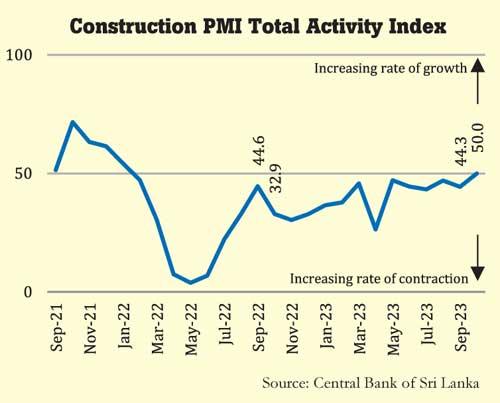04 Dec 2023 - {{hitsCtrl.values.hits}}
Resumption in State-funded projects cited as leading cause for sector’s return to activity
After a hiatus of nearly two years, Sri Lanka’s construction sector is showing signs of revival, with State-funded projects resuming activity that had been temporarily halted due to a shortage of both foreign currency and local funding amid the economic crisis.
projects resuming activity that had been temporarily halted due to a shortage of both foreign currency and local funding amid the economic crisis.
According to the construction industry Purchasing Managers’ Index (PMI) compiled by the Central Bank on a monthly basis, the industry has recorded an index value of 50.0 in October, from 44.3 index points in September.
In PMI, a value of 50.0 indicates a neutral level, signifying neither expansion nor contraction, while values above 50 suggest expansion and values below 50 indicate a decline in the respective economic activity.
The industry, serving as the lifeblood of the Sri Lankan economy by generating jobs and facilitating income distribution across all corners, has sustained a continuous decline for 20 consecutive months.
“Several respondents mentioned that some of the suspended government-funded projects recommenced at a limited scale during the month,” the Central Bank said releasing the October PMI for the construction sector.
“However, the industry operates with a low level of available work since most of the ongoing projects are in their final stages,” it added.
At the onset of the economic crisis last year, the government decided to suspend almost all construction projects and decided to redirect such money into providing relief to the mostly affected sections of the population from the economic crisis.
As construction requires a large amount of imported items, the limited foreign currency available in the country also put a prolonged damper on the industry.
While the new orders sub-activity declined at a slower pace in October from a month earlier, many survey respondents had observed a gradual increase in sizable tender opportunities, for projects which are going to be commenced from the first half of next year.
The employment sub-activity remained contracted as companies operate with limited staff under the current conditions which aren’t yet conducive for businesses.
The higher and rising taxes, rising utility and commodities prices are creating an enormous uncertainty for small businesses to operate at a time they have already been forced to pay at least three to four times more for what they paid two years ago, sending their production cost through the roof.
“…. several respondents highlighted the pressure emanated from the increase in energy-related expenses,” the statement from the Central Bank added.
While the respondents broadly expressed optimism over the industry outlook for the next three months due to the gradual recovery in the economy and the project work, they remain concerned about the upward trajectory in energy related costs and the impact of upcoming tax revisions.
28 Oct 2024 7 hours ago
28 Oct 2024 7 hours ago
28 Oct 2024 9 hours ago
28 Oct 2024 28 Oct 2024
28 Oct 2024 28 Oct 2024